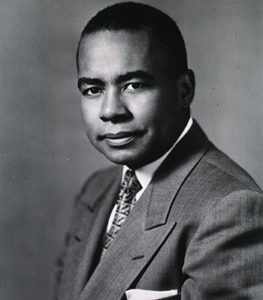
Paul Cornely
*Paul Cornely was born on this date in 1906. He was a Black physician, public health pioneer, and activist.
Paul Bertau Cornely was born in Pointe-à-Pitre, Guadeloupe. His mother was Adrienne Mellon, and his father was Eleodore Cornely. At the age of three, his family moved to Puerto Rico. He moved to the United States as a teenager and grew up mainly in Harlem and Detroit. He earned a bachelor's and medical degrees at the University of Michigan. Cornely was one of only four Black students in a class of 250. He was also a student during the Great Depression and worked to support himself throughout his studies.
Eventually, the Julius Rosenwald fund supported his medical studies. Because of segregation, Black physicians were only allowed to intern at Black hospitals, which were often overcrowded and had poor safety standards. Cornely was an intern at Lincoln Hospital. Upon finishing his internship, Cornely could not find a surgical residency program to admit Black physicians, so he returned to the University of Michigan to complete a doctoral degree. He specialized in hygiene and public health.
In 1934, he became the first Black person to earn a doctorate in public health in the United States. In 1934, Cornely joined the Howard University College of Medicine faculty. There, he developed a program that concentrated on public health provision to underserved communities. Cornely was aware of the Tuskegee Syphilis Experiment throughout its existence and, after the episode, taught it as a case study to African-American medical students. In later life, he described his failure to realize its ethical problems as a major mistake: "I considered myself to be an activist...yet here right under my nose something is happening, and I'm blind." He felt that it raised issues of racism and classism: "I saw it as an academician. It shows you how we looked at human beings, especially blacks who were expendable."
In 1939, Cornely founded the National Student Health Association. He worked in preventative medicine and, in 1942, was named Head of the Department of Bacteriology. In his early career, he visited historically black colleges and universities across the United States, monitoring the quality of health centers and other campus facilities. On his return to Howard University, Cornely wrote a series of recommendations to improve the living conditions of students at HBCUs. He was the Director of the Howard University Hospital, where he studied tuberculosis, sexually transmitted infections, and scarlet fever. He worked alongside black gynecologist Dorothy Boulding Ferebee.
Cornely became involved with the American civil rights movement in the 1950s, planning the Imhotep National Conference on Hospital Integration. The Imhotep conference series hoped to encourage voluntary desegregation to give Black communities access to quality care at otherwise white hospitals. In 1962, Cornely was the founding President of the District of Columbia Public Health Association, which became the Metropolitan Washington Public Health Association. In 1963, Cornely served as the medical coordinator for the March on Washington for Jobs and Freedom, where The Imhotep conferences continued until the Civil Rights Act of 1964 was passed.
Cornely advocated for culturally sensitive training to be given to white healthcare providers. Cornely called for psychiatrists and psychologists to recognize better the impacts of racism and discrimination on mental health. In 1967, Cornely worked with the American Public Health Association to lead a national conference on "The Health Status of the Negro." In 1968, he organized the Black Caucus of Health Workers, which continues to support African American public health workers. Cornely traveled across the United States, investigating the physical health and working conditions of nonwhites. In 1970, he was the first Black person to be elected President of the American Public Health Association. In 1973, after almost forty years at Howard University, Cornely retired as a Professor Emeritus of Community Health.
Cornely frequently called out pseudoscientific studies claiming Black people were inherently inferior, ignoring social determinants of health and wellbeing. In 1985, he wrote that "discrimination and segregation have no place in health." Beyond civil rights, Cornely advocated for public health for all, arguing that the government should provide healthcare to all citizens before getting "a man on the moon." Paul Cornely died on February 9, 2002.